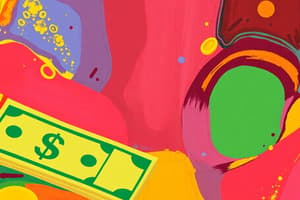Podcast
Questions and Answers
What is money management?
What is money management?
Planning how to get the most from your money.
What is a safe-deposit box?
What is a safe-deposit box?
A small, secure storage compartment in a bank rented for $100 a year or less.
What is a personal financial statement?
What is a personal financial statement?
A document that provides information about an individual's current financial position.
What is a personal balance sheet?
What is a personal balance sheet?
What is net worth?
What is net worth?
What are assets?
What are assets?
What is wealth?
What is wealth?
What are liquid assets?
What are liquid assets?
What is real estate?
What is real estate?
What is market value?
What is market value?
What are liabilities?
What are liabilities?
What is insolvency?
What is insolvency?
What is cash flow?
What is cash flow?
What is income?
What is income?
What is take-home pay?
What is take-home pay?
What is discretionary income?
What is discretionary income?
What is a surplus?
What is a surplus?
What is a deficit?
What is a deficit?
What is a budget?
What is a budget?
What is the consumer price index (CPI)?
What is the consumer price index (CPI)?
What is budget variance?
What is budget variance?
Study Notes
Money Management Concepts
- Money management involves planning to maximize financial resources.
- Safe-deposit boxes offer secure rental storage at banks, typically costing around $100 annually.
Financial Statements
- A personal financial statement summarizes an individual's income and expenses, reflecting their financial position.
- Personal balance sheets, or net worth statements, detail assets, liabilities, and net worth.
Key Financial Terms
- Net worth is calculated as the difference between total assets owned and total debts owed.
- Assets are valuable items owned, including cash, real property, and investments.
- Wealth signifies a significant amount of valuable resources or possessions.
Types of Assets
- Liquid assets are cash and items easily converted to cash, which provide immediate liquidity.
- Real estate includes land and structures owned by individuals or families, representing significant investment.
Financial Metrics
- Market value is the expected selling price of a property.
- Liabilities refer to debts and financial obligations owed by an individual.
Financial Health Indicators
- Insolvency occurs when liabilities surpass assets, indicating a financial crisis.
- Cash flow represents the actual money coming in and going out of personal accounts.
Income and Expenditure
- Income encompasses all incoming money, while take-home pay refers to the amount remaining after taxes and deductions.
- Discretionary income is the leftover money after essential expenses, like food and housing, are covered.
Surplus and Deficit
- A surplus is the extra money available after fulfilling financial obligations, which can be saved or spent based on priorities.
- A deficit arises when expenditures exceed income, leading to financial strain.
Budgeting
- A budget is a structured plan for managing income and expenses to fulfill financial goals.
- Budget variance indicates the difference between projected spending and actual expenses, essential for tracking financial performance.
Economic Indicator
- The Consumer Price Index (CPI) measures price changes for average consumer goods and services, reflecting inflation and purchasing power trends.
Studying That Suits You
Use AI to generate personalized quizzes and flashcards to suit your learning preferences.
Description
Test your knowledge with these flashcards on essential personal finance concepts from Chapter 3. Each card covers important terms like money management and safe-deposit boxes, helping you understand the foundations of managing your finances effectively.




